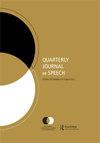“Look, an Illegal Alien!”: the rhetorics of migrant “Illegality” and the racialization of Mexicanness
IF 1.3
2区 文学
Q2 COMMUNICATION
引用次数: 0
Abstract
ABSTRACT There is a sociopolitical and juridical regime that I have designated in terms of “the legal production of Mexican/migrant ‘illegality’,” which is never separable from a larger discursive formation of migrant “illegality,” which has always also been constitutive to the (re-)racialization of “Mexican”-ness in the United States. As a scholar of rhetoric, Lisa Flores amplifies and illuminates these multiple dimensions of the rhetoricity of race, national identity, and citizenship. By examining this succession over the first half of the twentieth century of “moments of rhetorical crisis” surrounding the mass-mediated and highly politicized spectacles that produced “Mexicans” as “problem,” Flores critically demonstrates how U.S. public discourse has named “Mexicans” and called upon the public to see “Mexicans” — variously, as “illegal aliens,” “zootsuiters,” braceros, and “wetbacks” — such that the law and law enforcement, politics and policing, as well as mass-mediated public discourse have been indispensable for the ensnaring of “Mexicanness" within deportability and disposability and confining “Mexicans,” both migrants and U.S.-born ostensible citizens, within a regime of racial subordination.“看,一个非法移民!”:移民“非法”的修辞和墨西哥性的种族化
我在“墨西哥/移民‘非法’的合法生产”这一术语中指出了一种社会政治和司法制度,它与移民‘非法’的更大的话语形成是不可分割的,它也一直构成了美国“墨西哥”性的(再)种族化。作为一名修辞学学者,丽莎·弗洛雷斯(Lisa Flores)放大并阐明了种族、国家身份和公民身份等修辞学的这些多重维度。弗洛雷斯考察了二十世纪上半叶的一系列“修辞危机时刻”,这些时刻围绕着大众媒介和高度政治化的景象,将“墨西哥人”视为“问题”,并批判性地展示了美国公共话语是如何将“墨西哥人”命名为“墨西哥人”,并呼吁公众看待“墨西哥人”——各种形式,如“非法外国人”、“动物外套者”、“墨西哥人”和“偷渡客”因此,法律和执法,政治和警务,以及大众媒介的公共话语,对于将“墨西哥性”困在可驱逐和可处置的范围内,并将“墨西哥人”,无论是移民还是出生在美国的表面公民,限制在种族从属的制度中,都是不可或缺的。
本文章由计算机程序翻译,如有差异,请以英文原文为准。
求助全文
约1分钟内获得全文
求助全文
来源期刊

Quarterly Journal of Speech
COMMUNICATION-
CiteScore
1.80
自引率
36.40%
发文量
39
期刊介绍:
The Quarterly Journal of Speech (QJS) publishes articles and book reviews of interest to those who take a rhetorical perspective on the texts, discourses, and cultural practices by which public beliefs and identities are constituted, empowered, and enacted. Rhetorical scholarship now cuts across many different intellectual, disciplinary, and political vectors, and QJS seeks to honor and address the interanimating effects of such differences. No single project, whether modern or postmodern in its orientation, or local, national, or global in its scope, can suffice as the sole locus of rhetorical practice, knowledge and understanding.
 求助内容:
求助内容: 应助结果提醒方式:
应助结果提醒方式:


